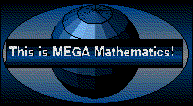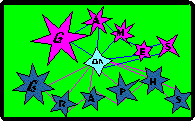


The goal of these activities is to expose students to graphs and let them experience the kinds of problem-solving that is done by mathematicians who study graphs. They will have an opportunity to develop the following skills:
No mathematician ever considers these skills entirely mastered; they work all their lives to develop them further. In evaluating students' performance, teachers should look for progress. For many students, understanding that such skills exist and are useful is an exciting, important, and very large step.
Students should be encouraged to participate in their own evaluation and recognize the progress that they make. When students recognize that these are skills that can be developed, they learn to become responsible for their own progress. One of the most valuable things that teachers can do is help students put their insights into both written and spoken language.
It is not necessary for students to learn the names of many graph properties, nor to learn which graphs have which properties. When students understand what a graph is, and that the strategies that you use to play the same game will differ depending on the graph that you play it on, they have learned very much about the nature and structure of graphs and the ways that mathematicians think about them.
Similarly, it is not important for students to learn all of the technical terms that mathematicians use to talk about graphs. It is interesting, however, to observe how many of these terms students will readily learn when they need them to communicate the observations that they make.


